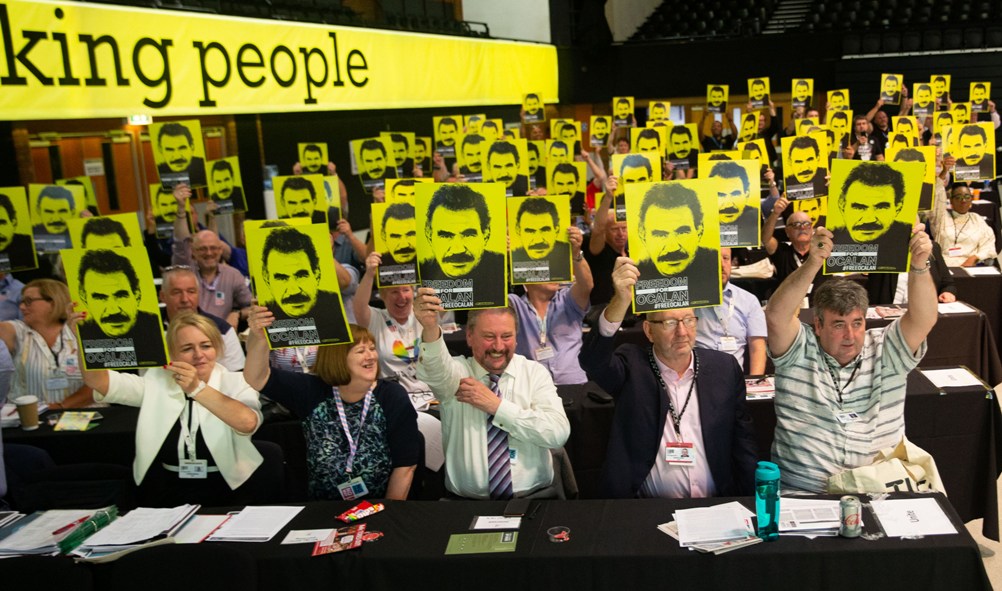The isolation of Abdullah Ӧcalan is far more extreme than the one many of us are now adjusting to. A world in which we are profoundly isolated from contact outside of our households. It can be difficult for any of us to adjust to these new circumstances but imagine if you were isolated for more than a few weeks, for more than a few months. Imagine if you were isolated for 21 years.
The Mandela of the Middle East
Abdullah Ӧcalan, the ‘Mandela’ of the Middle-East doesn’t have to imagine. He has been cruelly and barbarically imprisoned by the Turkish state for over two decades under barbaric conditions that breach the internationally accepted ‘Nelson Mandela Rules’ for the ethical treatment of prisoners.
The Freedom for Öcalan campaign was set up by the trade union movement to fight for his freedom and to end the isolation of Abdullah Ӧcalan.
Ӧcalan has been held on a tiny island of the coast of Istanbul which has been modified into a prison to hold him. He’s been imprisoned there since his capture in 1998 whilst travelling to South Africa at the behest of Mandela, who had offered him political amnesty.
The Turkish state uses Imrali island as its equivalent to both Robben Island and Guantanamo Bay. An extra-judicial mechanism to restrain those who would oppose its tyranny.Why such uncompromising steps to isolate one 71-year-old man?
An existential threat
Governments the world over have taken extreme measures to stop the spread of Covid-19. The virus is seen as such an existential threat that it requires extreme interventions even on the part of governments typically led by market orthodoxy and ideologically opposed to statism.
The isolation of Abdullah Ӧcalan by the Turkish Republic is an attempt innoculate itself against another type of existential threat; A political philosophy for Kurdish liberation encapsulated in ideas that could liberate us all; Equality, Democracy and Ecology.
The Turkish Republic was founded on an insistence that all races, creeds and cultures within its boundaries abandon their separate heritages and embrace a unifying Turkishness.
This ‘Turkification’ has led to a century of oppression for minorities in the republic and became the crucible in which Abdullah Ӧcalan and his compatriots combined Kurdish culture with an anti-imperial struggle to found the Kurdish liberation movement and Kurdistan Workers Party in 1978.

Our values our fight
The values of Ӧcalan; peace, pluralism, collectivism, solidarity, are the values of the trade union movement and we must fight to protect those values wherever they are threatened.
Ӧcalan has now passed his 20th year in a Turkish prison as the regime of President Erdogan ramps up its repression. Erdogan, the President of Turkey, is supporting union-busting, imprisoning trade unionists and illegally removing elected mayors and MPs from the left opposition, the People’s Democratic Party (HDP).
The brave Kurdish fighters, inspired by Ӧcalan, have been on the frontline in the fight against ISIS and are increasingly threatened by Erdogan’s government and his illegal wars. Furthermore, Turkey’s invasion of the region is causing a humanitarian catastrophe and the resurgence of ISIS.
‘Yesterday Mandela! Today Öcalan!’
The need for trade union support could not be more urgent. As the deafening silence of the international community continues to damn itself with inaction and empty rhetoric, the progressive forces of the world must take a stand and demand an end to this injustice, the isolation of Abdullah Ӧcalan and Erdogan’s crimes against humanity.
The trade union movement is playing a leading role in pushing this campaign forward and with every branch, region and committee that affiliates the rallying cry of ‘Yesterday Mandela! Today Öcalan!’ becomes undeniable.

The isolation of Abdullah Öcalan must end
Like the victorious campaigns to free Nelson Mandela in South Africa, the Cuban ‘Miami 5’ and most recently Lula in Brazil, the campaign to free Abdullah Ӧcalan is about more than one man. Now more than ever we must recommit ourselves to that proudest of trade union traditions, international solidarity in the cause of peace.